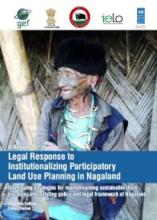Land Library
Welcome to the Land Portal Library. Explore our vast collection of open-access resources (over 74,000) including reports, journal articles, research papers, peer-reviewed publications, legal documents, videos and much more.
/ library resources
Showing items 1 through 9 of 15.A key purpose of this publication is to provide an account of SGP’s experience working with Indigenous Peoples over the last twenty-five years.
Community land, crucial to rural livelihood around the world, is increasingly targeted by commercial interests. Its loss can lead to environmental degradation, increased rural poverty and land disputes that last for years.
The Voluntary Guidelines on the Responsible Governance of Tenure of Land, Fisheries and Forests in the Context of National Food Security (FAO, 2012 – referred to in this guide as ‘the Guidelines’) were unanimously adopted by the Committee on World Food Security (CFS) in 2012, with subsequent broa
Up to 2.5 billion people depend on indigenous and community lands, which make up over 50 percent of the land on the planet; they legally own just one-fifth. The remaining land remains unprotected and vulnerable to land grabs from more powerful entities like governments and corporations.
A large number of countries recognize the role of forests in carbon sequestration and committed in their NDCs to protect forests, reduce deforestation rates, and restore forestlands.
This brief presents a review of 161 Intended Nationally Determined Contributions (INDCs) submitted on behalf of 188 countries3 for COP 21 to determine the extent to which Parties made clear commitments to strengthen or expand the tenure and natural resource management rights of
This book made an attempt to bring together various legislative protections available to the tribals communities pertaining to the land and governance in the scheduled areas and the role of different institutions to achieve the goals enshrined in the Constitution.
Likewise other tribal areas, the community in Kanker, Hazaribagh and Koraput have also been facing challenges emerged due to climate variability and change.
The report, prepared by the Indian Environment Law Offices, offers insights on mainstreaming Shifting Cultivation or Jhum through innovative interventions, such as Participatory Land Use Planning into policy, legal and institutional framework in Nagaland and help the state real



